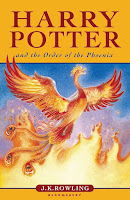 |
| (Amazon UK link) |
From the point of view of the overall plot, it works very well. The evil Lord Voldemort returns to power at the end of the fourth book, and is beginning to rally his forces. The government refuses to acknowledge the possibility of his having returned which means that Harry is considered to be deluded. His headmaster Professor Dumbledore, who believes Harry, is treated as being almost senile.
Then there are a lot of subplots interwoven through the book. The horrible Dolores Umbridge, evidently a caricature of an OFSTED inspector, takes up a fair amount of the story, as she takes on more and more authority in Hogwarts school. The whole Weasley family play larger roles than previously too, and there's yet another thread involving the half-giant Hagrid and his current endeavours.
At the same time, Harry and his friends are taking their OWLs (wizarding equivalent of GCSEs) and are being overladen with work. Oh, and Harry has to take some private lessons from his least favourite teacher, Professor Snape. He also organises a group for practising anti-dark-arts spells, and he tentatively gets involved with his first girlfriend.
JK Rowling manages all these (and more) plots cleverly, building them together to the thrilling climax of the book. But reading it this time, it felt like rather too many subplots for my taste, and I should think it would be overwhelming to a young child. Perhaps this is as well since much of the subject matter is far more suited to teenagers than to children.
Those who were the recommended age of nine when the first books were written would now be about 16 - the age of Harry's year. Those of twelve and above would probably enjoy this book and appreciate its complexity, but I'm surprised to hear of children of six or seven who like it.
My main problem with the book is that Harry does not seem consistent as a character. He's angry when the book opens, and also rather hurt: nobody has contacted him since the end of term, and he's worried about what Lord Voldemort's return might mean. He knows his friends Ron and Hermione are together - somewhere - and can't understand why he still has to put up with his awful relatives.
When he does eventually get to the place where his friends are staying, he discovers a lot of secrecy, People refuse to let him know what's going on: this is certainly enough to make him feel hurt again, and rather annoyed. But he starts yelling and screaming and generally behaving quite contrary to his previous self. The anger is necessary for some of the plot lines, but I felt it was overdone with too much explanation of his thoughts and not enough to make me sympathise.
Still, it was only in the early chapters that I felt this. Overall it's an excellent read, with the only proviso being that it's definitely best to have read some (perhaps all) of the other books beforehand. Whereas the second and third books do have some brief flashbacks or explanations about Harry's background, the fourth and fifth go straight into the story with very little background. I prefer it that way, but it would make it difficult for someone to pick this book up and read it without knowing anything about the previous ones.
Definitely recommended.
No comments:
Post a Comment